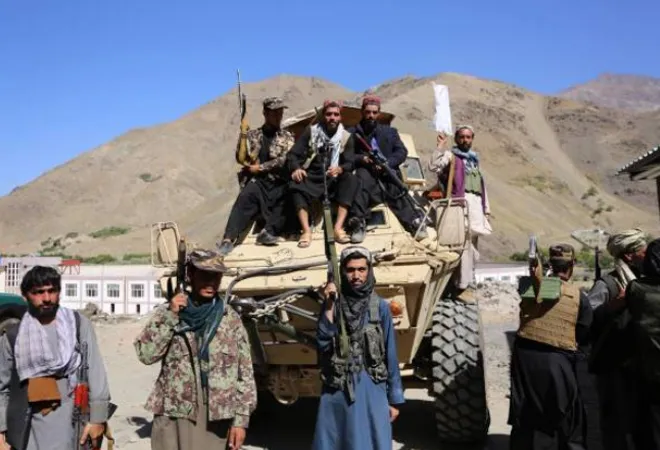 This article is part of ORF's Research and Analyses on the unfolding situation in Afghanistan since August 15, 2021.
This article is part of ORF's Research and Analyses on the unfolding situation in Afghanistan since August 15, 2021.
The withdrawal of the last batch of United States (US) troops from Afghanistan engenders several concerns regarding the foreign policy choices of all the South Asian countries down the road. Bangladesh, so far, has not given any concrete decision upon the recognition of the Taliban government. Following a “wait and watch” policy, the country is rather closely monitoring the situation in Afghanistan. Looking at the diplomatic chronicles of Bangladesh, one can see that it has always maintained a policy of non-interference regarding the internal affairs of other states. The Foreign Minister of Bangladesh has also stated that it is highly unlikely that Kabul’s political scenario will affect Dhaka in a considerable manner. Nevertheless, the two countries are still related to each other through bilateral relations and as members of the South Asian Association for Regional Cooperation (SAARC), and several intersecting affairs may come to the fore.
New geopolitical reality
From the perspective of Bangladesh, three relevant areas can be addressed—(i) regional stability, (ii) security, and (iii) connectivity. The concerns over regional security denote purely geopolitical issues. One of them is the involvement of regional and extra-regional powers vis-á-vis the newfound power vacuum in the Afghan territory. Apart from Pakistan, China and Russia have already provided de facto legitimacy to the Taliban government. Both of the countries have also abstained from voting on the United Nations Security Council (UNSC) resolution on 31 August that prevents Afghan territory from being used to “threaten any country or shelter terrorists” and demands that “the Taliban adhere to the commitments made by it regarding the safe and orderly departure from the country of Afghans and all foreign nationals”.
The Foreign Minister of Bangladesh has also stated that it is highly unlikely that Kabul’s political scenario will affect Dhaka in a considerable manner.
China’s inroads into South Asia and its popular ventures like the Belt and Road Initiative (BRI) are also to be taken into account. Beijing’s recent moves have led to suspicion over its geopolitical and strategic ambitions regarding Afghanistan and beyond. Moreover, China has reportedly asked the international community to engage with the new government of Afghanistan and actively guide it. Famous as it is, the geopolitical confrontation between China and the US, to some extent, is entangled here. Some US analysts are already expecting a strong Chinese presence in the internal politics of Afghanistan while referring to the fact how the US intelligence was outplayed by those of China, Russia, or Iran. It is quite impossible to skim through the realities and predict the future ahead; however, standing at the crossroads of multiple big-league nations and being so close to the Middle East, a turbulent Kabul can jeopardise the regional stability of South Asia. This eventually can impede the security of Bangladesh as well. Definitely, these are not “Bangladesh exclusive” concerns; yet, the shift in the balance of power hints at the necessity of cautious observations.
Some US analysts are already expecting a strong Chinese presence in the internal politics of Afghanistan while referring to the fact how the US intelligence was outplayed by those of China, Russia, or Iran.
Reemergence of extremism
On the other hand, for Bangladesh, another crucial security concern is violent extremism. There is a risk of the re-emergence of home-grown radical Islamist groups as a result of the Taliban takeover. Taking advantage of the digital means and social media, radical groups are misrepresenting or misinterpreting the various factions of the incident. Social media like Facebook and Twitter have already seen myriads of posts and comments sympathising with the Taliban, more importantly, linking the occupation to the “victory of Islam.” At least two radicalised persons have tried to reach Afghanistan from Bangladesh via India to “offer their services” to the Taliban government. Not to forget, after the end of the Soviet-Afghan war, it was the returnees from Afghanistan who founded the first Islamist militant organisation of Bangladesh, namely, the Harkat-ul-Jihad al-Islami Bangladesh (HuJi-B) in the early 1990s. Other international faith-based violent extremist organisations like the Islamic State Khorasan (IS-K) have already penetrated into the Afghan domain. IS-K has claimed the coordination of the recent attack at the Kabul airport on 26 August that killed 170 people, including 13 US troops. IS-inspired groups like the Neo-JMB faction of Jamaat-ul-Mujahideen Bangladesh (JMB) also exist in Bangladesh, and followers of these groups have been claiming their presence for a very long time. In fact, the 2016 attack at the Holey Artisan restaurant in Gulshan, Dhaka, was carried out by some of the young militants of the Neo-JMB group, and the IS later claimed its involvement. The incident took the lives of 22 people, which included a few foreigners. The US drone strike on a suspected suicide bomber at the Kabul airport on 29 August has also revamped radical voices in different parts of South Asia, highlighting anti-West or anti-American connotations. The Taliban question might not result in any direct onslaught in the terrain of Bangladesh; nonetheless, it still needs to be alert of the possible reemergence of radical Islamist ideologies.
The US drone strike on a suspected suicide bomber at the Kabul airport on 29 August has also revamped radical voices in different parts of South Asia, highlighting anti-West or anti-American connotations.
At the non-governmental level, a number of Bangladesh nationals had been involved in Afghanistan’s erstwhile state-building and development project, primarily as employees of BRAC, one of the leading NGOs of the country. Six of the nine Bangladeshi BRAC staffers have already returned home, and the rest are stranded but safe, as per updates from BRAC officials. Nevertheless, the two countries had been cooperating in the education sector aiming at Afghanistan’s social development. Bangladesh also hosts a number of Afghan students studying in different sectors. Education is one of the areas which might help Bangladesh and Afghanistan bolster their relationship in the future. On 31 August 2021, 148 Afghan students of Asian University for Women (AUW) in Chattogram, Bangladesh, were safely evacuated by US military planes. For Bangladesh, cooperating via the education sector and empowering the Afghan community through a people-centric channel can deliver prudent outcomes.
Refugees from Afghanistan
A critical area of concern, however, is the refugee influx resulting from the political makeshift in Kabul. Bangladesh has rejected the US request to host several thousand refugees from Afghanistan. The decision has its merit. Dhaka is currently struggling with as many as 1.1 million Rohingya refugees from Myanmar and has been doing so for a long while. The international community has not been able to provide any cogent solution to the problem; neither has the repatriation process been accelerated. Notwithstanding the fact that Bangladesh is also one of the most densely populated countries in the world, the government opened up the borders for the refugees solely on humanitarian grounds. Taking a new faction of refugees, even for a shorter period of time, would inflate the situation. Furthermore, there is an underlying crisis brewing. The Afghan refugee crisis will also shift the focus of the global refugee regime from the Rohingya issue. On the other hand, analysts have noted that the new influx of Afghan refugees in countries like the United Arab Emirates (UAE) may jeopardise Bangladesh’s export of labourers. In that case, there is a socio-economic dimension to the Afghanistan situation for Bangladesh, which needs to be taken in account.
Regional connectivity
The final issue to touch upon is regional connectivity. Despite being a member of SAARC, the presence of Afghanistan in the forum has not been widely pronounced. Now, it can resonate a concern amongst the member states since they will have to sit with the Taliban representatives at the same table to discuss the exigent regional agenda. As mentioned before, regarding the recognition of the regime, Bangladesh has been looking up to the decisions of the “friendly states” and may act as per the follow-ups. Nevertheless, SAARC can be a good platform to beckon primary contacts in the face of the changed geopolitics. So far as the issue of terrorism is concerned, SAARC provides a good option to utilise its 1987 Regional Convention on Suppression of Terrorism and the 2004 protocol for initiating a conversation. One may argue that the SAARC instruments are not sufficient to aim at a properly holistic approach; yet it is SAARC that can serve as primary grounds for engagement and deliberation amongst the South Asian nations, including Afghanistan.
The Afghan refugee crisis will also shift the focus of the global refugee regime from the Rohingya issue.
In conclusion, it can be stated that the future of Bangladesh-Afghanistan relations after the Taliban occupation depends on how the new regime is going to formulate its foreign policy preferences as well as how the neighbouring states may respond to the new rhetoric, narratives, and policies. Certainly, this is not going to propel any overt shift in the purview of Bangladesh’s policy preferences. However, the aforementioned concerns related to regional stability, security, and connectivity manifest some indirect implications for Dhaka. The future of the relations can be observed and analysed by focusing the lenses on these key areas and the opportunities or challenges they confront.
The views expressed above belong to the author(s). ORF research and analyses now available on Telegram! Click here to access our curated content — blogs, longforms and interviews.



 This article is part of ORF's
This article is part of ORF's  PREV
PREV


